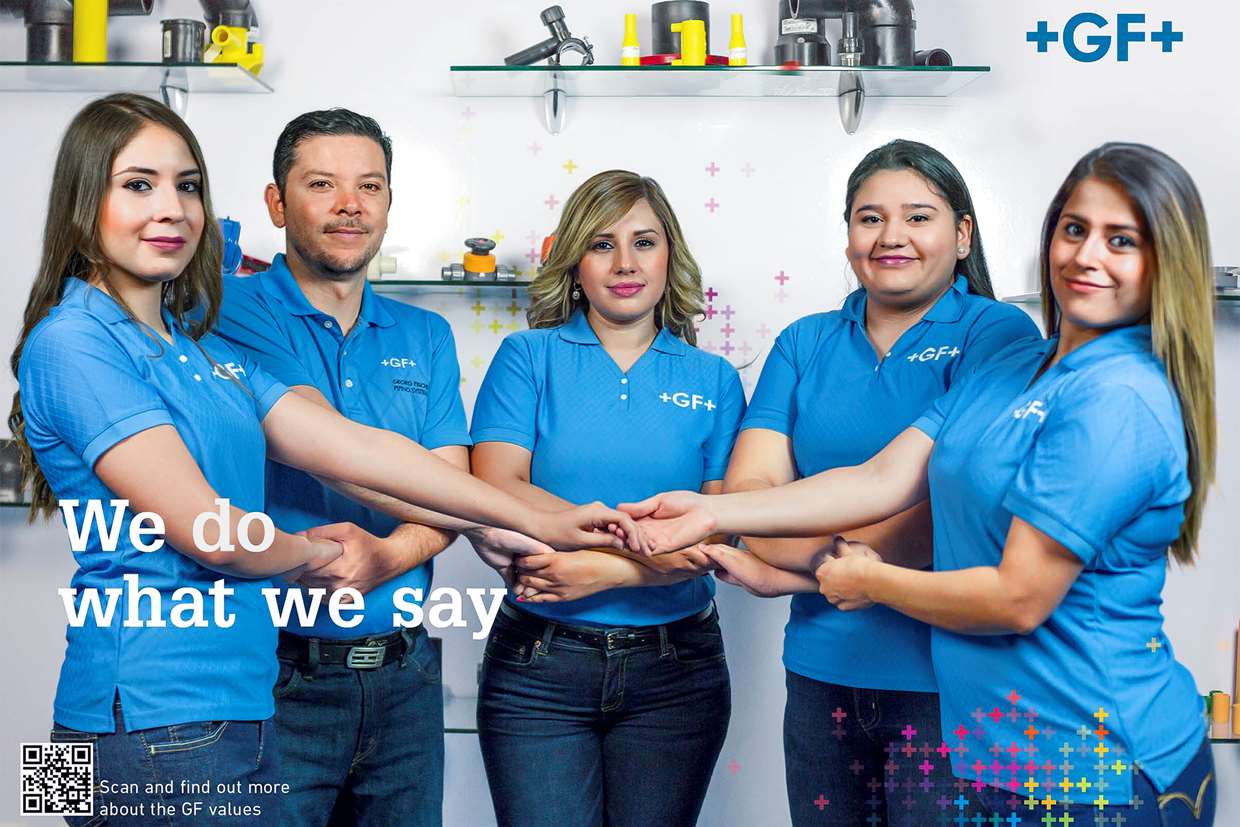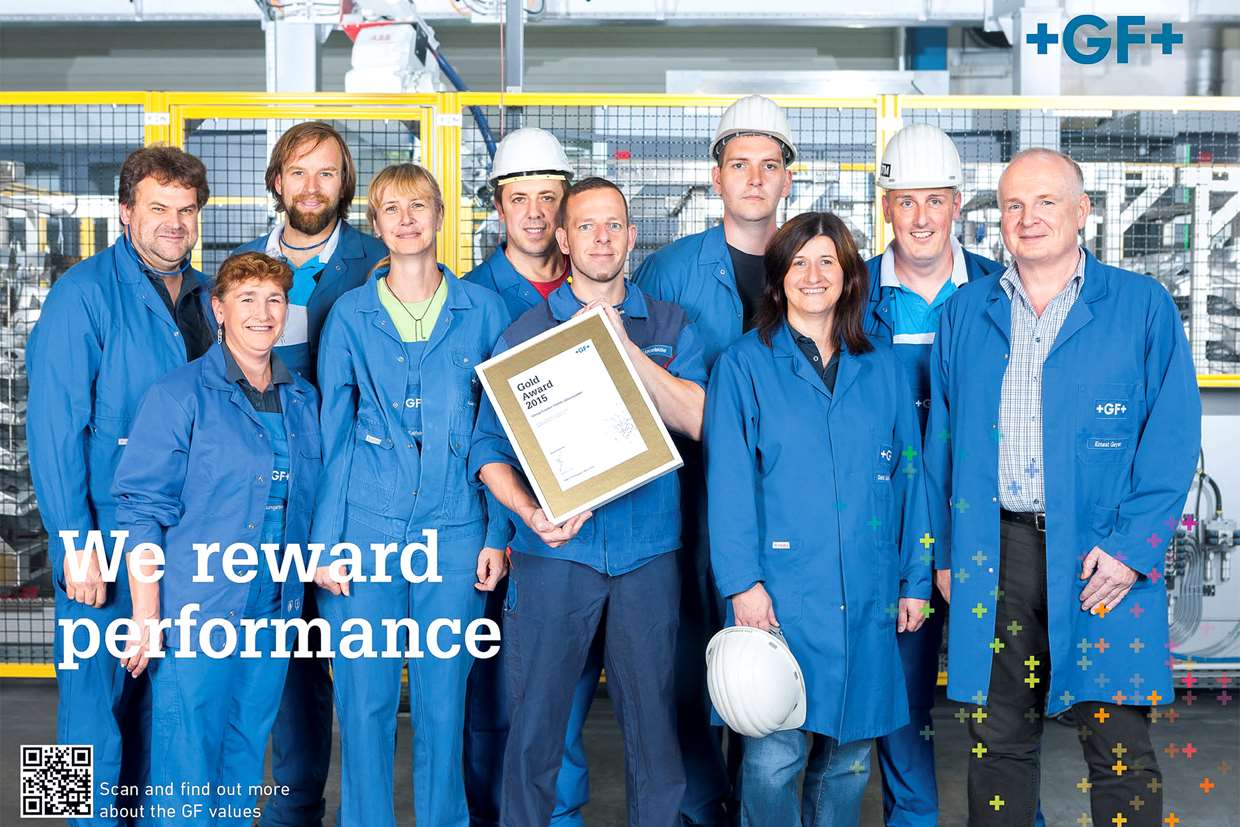Good governance
As an international industrial Corporation, GF is at home in a variety of segments and countries. Wherever we operate, we comply with the applicable laws and regulations. We firmly believe that sustainable and long-term success is based on good Corporate Governance and ethically impeccable conduct.
Anchor-1Business conduct
GF’s business conduct and Corporate strategy are based on the foundation of five values. They shape and embody the philosophy and spirit of GF in our daily work for the benefit of our key stakeholders and our company. The values are translated into a set of standards for ethical conduct and integrity, which define GF’s Corporate culture and are summarized in the Code of Conduct document. The Code of Conduct is published in 18 languages and is binding for employees of all three divisions and at all locations1. For the daily operations of the GF entities, it is complemented by internal policies and regulations implemented at the Corporate and local levels.
Corporate Governance
The Board of Directors and Executive Committee are the highest management bodies of GF. They attach great importance to good Corporate Governance. The implementation and continuous improvement of the generally accepted principles of Corporate Governance ensure the presence of a necessary level of oversight, strategic and tactical management of the Corporation and its entities, as well as transparent communication with our internal and external stakeholders on all topics relevant for an assessment of the quality of GF as a Corporation.
The Board of Directors is responsible for monitoring the management of the company and for determining its strategic direction and financial and accounting policies. The three standing Board Committees (Audit Committee, Nomination Committee, and Compensation Committee) prepare the relevant topics for the Board of Directors as a whole. Where required, temporary committees can also be formed.
The Executive Committee addresses all issues of relevance to the company, takes decisions within its remit, and submits proposals to the Board of Directors. The Chief Executive Officer and the Heads of Corporate Development and Corporate Finance & Controlling make up the Corporate Center2 and support the Board of Directors in meeting its responsibilities.
In the interests of its stakeholders, the Georg Fischer Group, which is organized in accordance with Swiss law, fulfills all obligations under the guidelines of the Swiss Stock Exchange with regard to information on Corporate Governance. For detailed information, including but not limited to the tasks of each Board Committee and the Compensation Report, please see the respective section in the Annual Report 2017.
Risk management
Enterprise risk management is used at GF as a fully integrated risk management process, and it is systematically applied at all levels of the Corporation. Twice a year, the three divisions, the Corporate employees and all significant Corporate companies prepare a risk map of the key risks with regard to strategy, markets, operations, management and resources, financials as well as sustainability. The likelihood of the risk occurring is classified into one of four categories. Where possible and appropriate, the identified risks are subject to a quantifiable assessment, taking into consideration any measures that have already been implemented. Alternatively, a qualitative assessment of the risk exposure is applied.
The Head of the Service Center Risk Management & Tax acts as the Chief Risk Officer (CRO) and, in this function, reports directly to the CEO. The CRO is supported by a non-executive Risk Officer in each division. Supplemented by the Corporate Compliance Officer (CCO) and internal experts in Corporate Risk Management, the Risk Officers under the leadership of the CRO constitute the Corporate Risk Council. In 2017, this Council met twice. In addition, the CRO conducted workshops with the management of the three divisions as well as with the Executive Committee to analyze the risk situation, to discuss measures to mitigate risks, and to define the actual top risks for each unit.
The topics of these meetings were the optimization of risk reporting of compliance risks, the findings of a benchmark analysis regarding the enterprise risk management and business continuity management processes, as well as analysis of the risk maps. Identified risks were discussed in the Executive Committee, and adequate mitigating measures were determined. The resulting risk report was reviewed and approved by the Board of Directors in December 2017.
For further information on risk management, please see the relevant section in the Annual Report 2017.
Anchor-2Corporate compliance
Compliance with the applicable laws and guidelines worldwide as well as with business ethics standards is monitored by Internal Audit and the CCO. The CCO reports to the General Counsel or, where necessary, directly to the CEO. As a member of the Corporate Risk Council, the CCO’s task is to ensure that the issue of risk management is given appropriate importance within the company.
Training is carried out under the direction of the CCO at the Corporate companies by means of e-learning or in person. The Executive Committee determines the respective focus topics together with the CCO. A range of internal compliance training sessions were held in 2017, including:
- –an e-learning program on Anti-corruption/Anti-bribery for about 850 employees
- –an e-learning program on Antitrust/Competition Law for about 650 employees
- –an e-learning program on Export Controls/Sanctions for about 450 employees
- –on-site training at newly acquired companies in the Middle East, Turkey, and China, and for specific employees with compliance roles
A total of 10’500 employees have received compliance training since it was introduced in 2011. The training program is ongoing, and the employees are required to participate every three years. In addition, in 2017, the Corporate Legal Department began offering one-on-one meetings to Senior Managers visiting Schaffhausen from other locations in order to provide general as well as specific legal advice and training to them upon request.
To further reinforce the compliance function in the company and to give due consideration to GF’s strong presence in China in particular, the following measures have also been in force since 2015:
- –Consistent implementation of the “GF Compliance Agreement for Intermediaries” as a guideline for GF business partners who act on behalf of or in the interests of GF companies as well as the continuation of specific compliance measures for intermediaries in China.
- –Development of a web-based system to avoid conducting business with sanctioned organizations and individuals.
- –Introduction of a “Compliance Agent” function to help to identify and assess compliance risks, to carry out initial cursory internal compliance controls on-site, and to support the identification and implementation of appropriate new measures.
A whistle-blowing program enables all employees to report any breaches of legislation or guidelines anonymously to the CCO. Proven breaches are subject to appropriate sanctions.
Anchor-3Product and service information and labeling
GF adheres to all relevant rules and regulations with regard to product safety and relevant labeling and information provided to our customers. This includes but is not limited to
- –enclosing the CE3 and RoHS4 labels, when relevant
- –upon customer request, providing to them a manufacturer declaration regarding conflict minerals (following the Dodd Frank Act) as well as a safety declaration regarding the presence of substances of very high concern in the products (according to REACH legislation)
Dedicated working groups within the divisions (e.g. Product Stewardship Group within GF Piping Systems) address issues related to the environmental, health and safety standards of GF products. These groups are responsible for tracking of new regulations and trends, defining and ensuring necessary internal processes, conducting relevant trainings and supporting customer inquiries.
1The Code of Conduct is an integral part of each employment contract.
2See “Organization of GF” in the respective section of the Annual Report 2017.
3Indication of conformity with health, safety, and environmental protection standards for products sold within the European Economic Area (EEA).
4Indication of conformity with the EU’s Restriction of Hazardous Substances Directive.








Download
Center
Print
Share